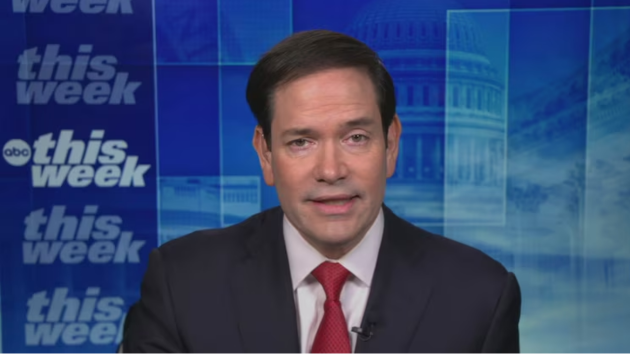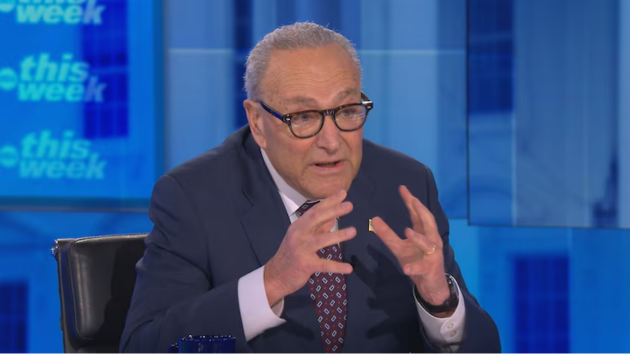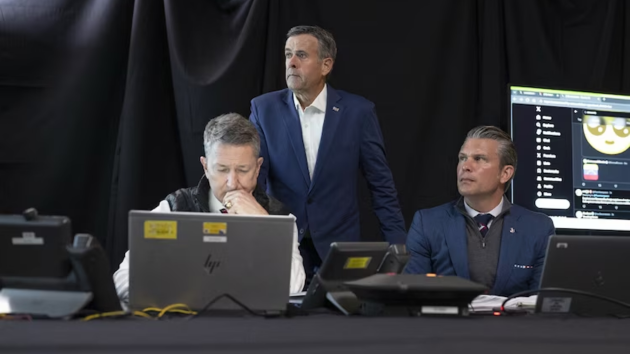Homeland Security Secretary Mayorkas speaks on Biden order restricting asylum
Written by ABC Audio ALL RIGHTS RESERVED on June 6, 2024
(NEW YORK) — Immigration policy will be a major factor in November elections. And a few months ago, it looked like lawmakers might have a bipartisan immigration reform bill in the works.
The bill, from senators like Republican James Lankford, had a number of provisions border hawks had been wanting in place for years. In particular, they wanted to end the practice of what they call “catch and release” – where migrants are arrested at the border and released from the government’s custody to appear in court later.
The law in America is that if you reach land you can generally apply for asylum. If you’re fleeing persecution or violence, you can ask for refuge here. But a person must be on American soil to do it.
All along the southern border there are official border crossings. They are called “points of entry” and every day hundreds of people get to walk across the bridge and into an office or other location and formally ask for asylum.
However, barely a thousand people a day are invited across the border to do this. Everyone else is told “the line is too long, we’ll get back to you on our app, maybe weeks or months from now. Just wait there.”
There are thousands more people who feel they don’t have that kind of time. So every day they come across the border illegally. Through the desert, across the Rio Grande. They often present themselves to border agents and immediately say “asylum” because they know the law. They know they get to jump-start the proceedings and perhaps get the help they desperately need.
This bipartisan bill was supposed to disincentive this practice by allowing the government to turn more people away. And crucially, by funding more of these formal asylum hearings for those who wait in line. It would pay for more judges, more court staffers.
But after clamoring for it for years, House Republicans killed the bill at the request of former President Donald Trump. He apparently told them not to hand Democrats a bipartisan victory.
This week, President Biden issued an executive order, which he said now gave him the power to tell migrants that just because they made it to American soil, it doesn’t mean they get to apply for asylum. If people enter the country illegally, starting now they’ll be sent back.
This went into effect at 12:01 a.m. Tuesday morning and Homeland Security Secretary Alejandro Mayorkas spoke with “Start Here” to explain more about Biden’s executive action.
START HERE: This morning, we’ve got someone here to explain the administration’s thinking on this. Homeland Security Secretary Alejandro Mayorkas joins us now. Thanks for being with us.
MAYORKAS: Thanks very much for having me, Brad.
START HERE: First off, can you just walk us through these executive actions? How is this gonna work?
MAYORKAS: Yeah. So, here is how it works: It will be in effect immediately. And what it provides is that individuals encountered in between the ports of entry at our southern border will be barred from seeking asylum. The way in which they can seek asylum now, with this order in effect, is by using the CBP One app and making an appointment to arrive at the port of entry, at a port of entry in a safe and orderly way, or accessing one of our many other lawful pathways that we have established for people to receive humanitarian relief without placing their lives in the hands of smugglers.
So if those lawful pathways are not used and people arrive at our southern border, they will, in between the ports of entry, they will be barred from asylum. If the number of people we encounter averages, for seven consecutive calendar days, less than 1,500 then we will lift this bar and we have the right to reinstitute the bar if the numbers average 2,500 people encountered a day for seven consecutive days.
START HERE: So 2,500 is the point where you guys say, ‘we’re going to shut this, this type of asylum off,’ — and then 1,500. It needs to get down to that point before you open it up again.
MAYORKAS: If it’s below 1,500 for seven consecutive days, we will reopen 14 days after the seventh day. If the numbers climb back up for seven consecutive days to an average of 2,500 or more, we will reinstitute. We can reinstitute this asylum bar.
START HERE: When’s the last time that this country averaged 1,500 crossings a day like that?
MAYORKAS: It has been quite some time, but then again.
START HERE: But you haven’t been secretary while it’s been that low, I believe. Right? It’s never been that low.
MAYORKAS: That is correct. But Brad, what we have done over the past three years is build lawful pathways and, in fact, more than a million people have accessed those lawful pathways in the past year. So, asylum is very much still alive, but we are deterring irregular migration in between the ports of entry and trying to cut out the smugglers, which is not only a matter of criminal justice, but a humanitarian imperative.
START HERE: I get that, and I get that you guys are trying to funnel people toward the quote/unquote, like ‘right way of doing things.’ But why, how is this not just a – can’t you guys just say this is a permanent ban in effect, like the whole idea that this is temporary seems to be out of touch with what the numbers have told us for years now.
MAYORKAS: I don’t, I don’t think that’s that’s true. And I think you are, you know, frankly, Brad, predicting a landscape in the future. And that landscape is very dynamic and evolving, and it is certainly our hope that with our continued press on lawful pathways, our continued attack against the smugglers and the cartels and this bar that we will be able to drive lawful pathways successfully.
And by the way, we’re doing so not alone, but with our partners throughout the region.
START HERE: Hey, there are exceptions here, right? Can we talk about this? I believe there are exceptions for minors.
The big question right now appears to be if a minor, if an unaccompanied minor still can perhaps get into the country and apply for asylum, does that encourage more parents to send their kids across the border like it’s almost preferable in that case to send them alone?
MAYORKAS: Brad. Brad, the reality is that desperate parents are sending their unaccompanied children now, and we felt that it was, the humanitarian, correct humanitarian thing to do, adhering to our values to exclude unaccompanied children from operation of this rule. There are other exceptions as well. For example, somebody with an emergent acute medical condition. Somebody who’s suffered a severe form of trafficking. These are humanitarian measures that we have taken.
START HERE: Can we talk about the court challenges that will inevitably come with this? Are you guys invoking now the same sections of the Immigration and Nationality Act that Trump did for some of his policies, that it was President Biden that rescinded these policies? Right? So how will you defend this in court?
MAYORKAS: Brad, we will defend this in court. We do anticipate that the ACLU has indicated it intends to challenge this rule. We believe that this rule is lawful. We have only taken what we believe to be lawful actions.
This is quite different than what Trump did. Trump issued a ban across the board, an unequivocal ban, without exception. We have, as you noted correctly, there are exceptions. In addition, we have the lawful pathways that did not exist during the Trump administration.
START HERE: And then lastly, you mentioned our partners in the region. Does this put Mexico now in an impossible position? Because under President Trump, they were dealing with, like, all these people who have been told to remain in Mexico.
And we saw like the intense public support that they had to get from Mexican taxpayers. We’ve tried to be, like you said, partners with Mexico. We rely on them for so many things. Are we now telling them, ‘Hey, you’re about to have a lot more people sitting along your border, Deal with it.’?
MAYORKAS: No. The former president threatened Mexico. We are working very closely with Mexico, in partnership with Mexico and other countries, in what we anticipate and what we hope for is that fewer people will cross into Mexico, and traverse Mexico to our southern border, because of the operation of this rule.
START HERE: That’s really all I have for you unless you want to add something.
MAYORKAS: We are taking action, in the wake of congressional inaction. And what really needs to occur is the United States Congress needs to act to fix what everyone agrees is a broken immigration system.
This regulation is no substitute for legislation. The president cannot take executive action and provide this department and other departments in the government with additional resources. Only Congress can do that. The Senate’s bipartisan legislation would have provided us with much-needed resources and much-needed fixes to our statutes that underpin our immigration system.
START HERE: A lot more conversation still to be had about this policy, especially in an election year. Secretary Alejandro Mayorkas, really appreciate you taking the time, really appreciate you spelling all this out. Thank you so much.
MAYORKAS: Thank you, Brad.
Copyright © 2024, ABC Audio. All rights reserved.







